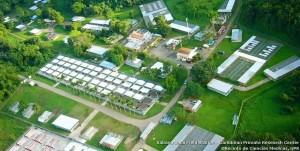July 1, 2015
 According to news reports, late Saturday/early Sunday at the Sabana Seca Field Station of the Caribbean Primate Research Center, a cage was forced open and at least 21 monkeys were freed. The field station is located in Toa Baja, a town on the northern coast of Puerto Rico, where Puerto Rico’s Department of Natural and Environmental Resources estimates that some 550 rhesus monkeys and 200 pata monkeys live in the wild.
According to news reports, late Saturday/early Sunday at the Sabana Seca Field Station of the Caribbean Primate Research Center, a cage was forced open and at least 21 monkeys were freed. The field station is located in Toa Baja, a town on the northern coast of Puerto Rico, where Puerto Rico’s Department of Natural and Environmental Resources estimates that some 550 rhesus monkeys and 200 pata monkeys live in the wild.
News reports are, of course, claiming the primates are dangerous, infected with viruses, and are being recaptured. This is not unusual spin orchestrated by the targeted facilities and their perpetrators of animal abuse.
According to news reports, “The cage’s padlock was removed and the chain cut, allowing about 30 Rhesus monkeys to escape from the CPRC.”
Wild monkeys move in bands and some members of the group are always on watch to alert the rest of the band to danger. When the guards scream their alert, the band flees from humans with such speed and agility that a casual encounter is unlikely, according to Carlos Carazo, Puerto Rico’s assistant secretary of Environmental Health.
Although they can transmit rabies, Simian Immunodeficiency Virus, and other infectious agents that can sicken humans, Puerto Rican authorities have no record of any instance of transmission of viruses from monkeys to humans on the island.

